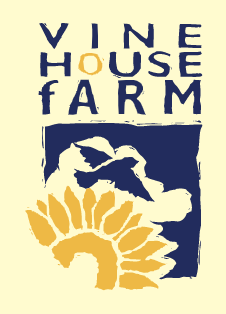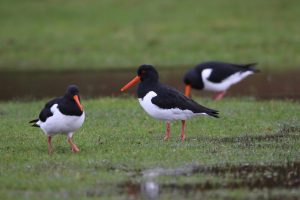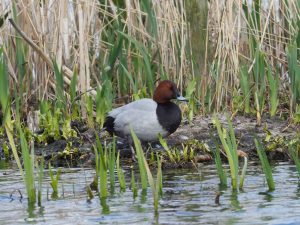
It stopped raining on 29th February. 10.5mm fell that day and we have only had 14mm, or .55ins, in the whole of March here at Deeping St Nicholas. The last week of March has been very cold but overall it has been a bit warmer than average at 6.5°C.

At the end of February the land was full up, we were as wet as we had been all winter and we were fairly certain we would have to fallow one or two fields. That is not the case now, fortunately the wind has been blowing and the soil has dried out quicker than expected. We are having to be very careful on how we cultivate the fields to try and preserve the moisture. We, like many other farmers, have been very busy drilling a lot of barley which will mean a surplus. We are drilling barley because it was too wet in the autumn to drill wheat.
We normally get a better return from spring barley than spring wheat. The barley will not yield as much as the wheat planted in the autumn. The price of grains has risen, partly due to the fall of the pound and partly due to the expected shortage of wheat. The price of wheat is back to where it was two years ago: £35/tonne higher than it was last harvest.
No one can accurately forecast the rise and fall of grain prices but there are futures markets. If we see a good price a year in advance, we are able to sell on the futures market but not many of us do that. Instead a tonnage of grain is put in a merchant’s pool, 9-12 months in advance of the month we want to sell. We select January, February, March, May and June to sell, months when we are not going to be busy with potatoes. The merchant hears all the news and can sell grain when he thinks the price is right. At the end of the month that we have been using the merchants’ pool, we get paid the average price that he has made for that month. By using the merchants pool it takes worry and time off the farmer so that he can concentrate on farming matters. We cannot put all of our expected tonnage in pools however. If we did and we were to have a bad harvest, growing less than we had sold, we would have to buy in grain to supply the shortfall in the merchants’ pool.
We started lifting our last field of potatoes on 23rd March, finishing what we could on 28th March and had to abandon about 10 acres. The potatoes have kept very well in the ground, they are destined for supermarkets and so there is still a demand for them.
We are very busy in our bird seed factory and have not always been able to get orders out to you on the day that they were ordered. On top of that, our carriers have also been stretched and they have not always been able to deliver the next day. We have plenty of seed in stock, but are running out of suet as the company supplying us has closed their factory. By the time you receive this we will have run out of most suet products. Every bird has to take its nestlings moist food and moist foods are suet, insects and fruit. I find the easiest fruit to feed is sultanas. I have been feeding the Starlings around the farm in April, May and June with soaked sultanas for several years now. I soak them in water for two or three hours and then the Starlings feed their nestlings on them, we sell them in 12.5kg boxes as well as 3kg bags.


The winter spectacles on the farm are gradually disappearing. The finches and buntings that I have been feeding are going back to where they nested last year, deserting the food that they have been eating here and, in many cases, struggling to find food where they are returning to. Most don’t stay on the farm because there is a natural urge to return to their previous territory.
It is easy to feed the birds in the winter as they roam about looking for food. In the summer they spread out over the whole countryside. Insects form a large part of their diet but insects are getting in short supply, partly because of modern farming. To feed them, and their young, in the summer we need to create insect rich habitat which is what we have been doing.
Over 1,000 Wigeon that have been grazing our wetland are gradually returning North and East. Amongst the grazing Wigeon there are a few Shoveler, Gadwall, Tufted ducks, Teal and several Mallard which stay to breed. They need long grass to conceal themselves while sitting on eggs and on islands on the wetland the grass is still long – too long and coarse for the Wigeon to eat. The wetland is 35 acres of grass and it has been grazed right down until the grass is only about 1 cm tall. This suits the Lapwings as they like to nest in short vegetation so that they can see if an intruder is coming. When the intruder appears they leave the nest and help their mate in harassing the Crow, Fox or Buzzard. By harassing the intruder they are irritating it and it is not able to concentrate on what it has come for and so hopefully the intruder goes away empty handed.
We have about four pairs of Redshanks on the wetland. These are a more timid bird than the Lapwings and they will have to wait until the grass grows as they nest where they can conceal themselves whilst sitting on eggs. If an intruder arrives they sit tight, only fleeing the nest when absolutely necessary. They will however mob intruders if they have young.
Barn Owls did not fare well in the windy February, there were strong winds almost every day from 8th February to the beginning of March. Barn Owls hunt by sound as well as by sight, so cannot hunt successfully out in the open in wet and windy weather. Owls able to sit in a farm building within their territory could look for mice. Sadly we found three dead Barn Owls on the farm in February.
Migration is taking place as our winter visitors go back North. On 31st March I saw a Short Eared Owl, three Green Sandpipers and 20 Fieldfares. Wigeon numbers were still about 1,000 on 23rd March but by 31st March were down to 400. I heard my first summer visitor on 27th March, a Chiffchaff singing in our paddock and it won’t be long before the first Swallows and a few Warblers start to arrive. Swallows are arriving about a week earlier than they did do 50 years ago, according to my diaries, due to warmer temperatures. They do leave us about a month earlier than they used to 50 years ago because their food – flies – are just not around in the autumn like they used to be.
TALKS & EVENTS
Due to the current situation the Farm Walks in April, May & June are cancelled. All ticket purchases will be refunded.
We will confirm later on, if the walks in July & August can still go ahead



